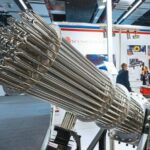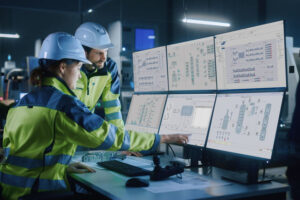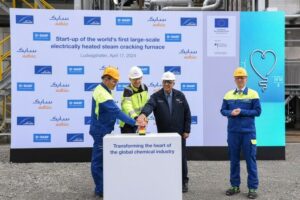- Green electricity has a key function
- Hydrogen makes green energy flexible
- Hydrogen defossilises the chemical industry
- Battery production drives mechanical processes
- The circular economy is indispensable
- Digitalisation moves forward
- Modularisation is picking up speed
- From the laboratory directly into pharmaceutical production
The chemical industry is undergoing the biggest transformation in its history. The EU wants to become greenhouse gas neutral by 2050. It has set the framework conditions for this with the Green Deal. Since the European Parliament and the Council adopted the 2021 Climate Change Act, the climate targets have also become legal framework and the EU interim target for reducing emissions by 2030 has been raised from 40% to at least 55%. The legislative package known as „Fit for 55“ includes regulations that are intended to put Europe on this path. Politicians have thus set the target. The task now is to achieve this in the coming years.
Green electricity has a key function
Green electricity will play a key role in this system. The direct utilisation of wind and solar energy is very efficient, but these two energy sources are not always available in sufficient form. Who wants the lights to go out in the stadium just because there is no breeze that evening? It is therefore necessary to store wind and solar energy for dark or slack periods. In addition to the classics such as pumped storage power plants, there are now various other options. Hydrogen and lithium-ion batteries are currently favoured.
Hydrogen makes green energy flexible
The conversion of green electrical energy into green hydrogen takes place in so-called electrolysers, however with a significant loss of energy. Liquefying the element hydrogen also costs energy in order to be able to transport it afterwards. This is a problem that has to be accepted in order to utilise renewable energies independently of time and location.
The German industry, for example, requires very large quantities of renewable energy, which cannot be covered by nationally available potential due to their geographical location. This is where hydrogen comes into play: It can be used, for example, to store the energy of the desert sun in chemical form over long periods of time. It is available at any time and can be transported over long distances.
Green hydrogen from Africa – a way out of the energy crisis?
Hydrogen defossilises the chemical industry
In a renewable energy system, hydrogen power plants (gas turbines) and fuel cells can therefore be used to bridge dark periods and compensate for fluctuations. But green hydrogen can do more: in the chemical industry, it contributes significantly to the defossilisation of processes. Green ammonia forms the basis for a sustainable fertiliser industry. Green hydrogen can be converted into green base chemicals via Power-to-X, which can then be used to produce e-fuels such as aviation petrol or marine diesel. However, this requires enormous quantities of green hydrogen. The rapid expansion of hydrogen production and infrastructure is therefore one of the most important prerequisites for a successful energy transition.
The Achema Special Show Hydrogen aims to bring together precisely those players who want to help shape the rapidly developing hydrogen economy. It is aimed at decision-makers from politics and industry, experts and solution providers. Topics include the upscaling of production and infrastructure, innovations for handling hydrogen, Power-to-X and the design of a hydrogen ecosystem.
Battery production drives mechanical processes
Lithium-ion batteries are an alternative to hydrogen as a storage element. Green energy that comes from the solar system on the roof of a house, e.g., can be stored directly in an energy storage unit for the night. After sunset, the household is supplied with electricity from the energy storage system. Lithium-ion batteries are the core element of energy storage systems. The advancement of electromobility also demands ever better and longer-lasting lithium-ion batteries.
The art of manufacturing these batteries is to keep the quality of the battery masses at the optimum level through precise mixing processes. This significantly increases the service life of the batteries. The rapidly increasing number of batteries being manufactured requires large quantities of process engineering equipment that is suitable for handling and producing the battery masses. Handling and dosing systems, containment systems and mixers of all kinds for the production of battery masses will therefore be on show at Achema.
The circular economy is indispensable
No sustainability without a circular economy. This also applies to the chemical industry. Linear production chains must be completely rethought. Produce, use, throw away: That no longer works. The carbon cycle must be closed. The end result must no longer be CO2 emissions, but the complete recycling of product and material flows. To achieve this, products must be designed from the outset in such a way that they can be easily recycled. Plastic products, for example, should be as unmixed as possible so that they are perfectly suited for mechanical recycling. If this cannot be realised, chemical recycling can be a solution. Ultimately, the aim is to achieve CO2 neutrality in the process industry.
The topic of sustainability is a cross-industry melting pot that runs like a green thread through all exhibition areas at Achema. Sustainable solutions for the chemical industry can therefore be found in all halls of Achema.
Digitalisation moves forward
Digitalisation in the process industry continues to advance. IT and OT are merging more and more. This brings great advantages, but also considerable disadvantages. The self-sufficient and self-contained process control systems of the past were inaccessible to hackers. Things are different today. Data transfer from one location to another, big data analyses and much more connect the OT world with the IT world and make it vulnerable to attack. This creates something of a race between corporate IT and hackers. Artificial intelligence is fuelling this competition even further. Companies in the chemical and pharmaceutical industries would do well to secure their processes as well as possible. The challenge for companies is to find exactly the right solution for their operations. At Achema, numerous manufacturers will therefore be offering concepts and solutions that can be used to exploit the benefits of digitalisation without immediately falling foul of hackers.
Modularisation is picking up speed
Since the last Achema 2022, it has been clear that modular production can no longer be stopped. The experts at the cav-/phpro web session „MTP and modular production“, which took place last autumn, also agreed on this point. Flexible and cost-effective production – these are arguments that no company in the chemical-pharmaceutical industry can ignore. Accordingly, there are already many solutions from POL to automation components of individual modules that can be used in modular production. Achema 2024 marks the point at which the next step can be taken: the leap from pilot status to full-scale production. The basis is in place, especially as the PNO will take the next standardisation steps at MTP in autumn 2024. Plug & Produce will thus become a reality.
From the laboratory directly into pharmaceutical production
The pharmaceutical industry is currently one of the most dynamic and exciting sectors of all. New and innovative research and production methods are permanently changing the pharmaceutical industry. This became particularly clear during the Covid pandemic: the mRNA vaccines from Biontech-Pfizer and Moderna require sophisticated packaging and logistics concepts to ensure storage temperatures between –60 and –80 °C, for example. As the pharmaceutical industry grows, so does pharmaceutical machinery manufacturing. Accordingly, manufacturers of filling and packaging machines will be at Achema 2024 to present their latest concepts and machines.
Conclusion
Achema 2024 once again offers a colourful bouquet of technologies for the process industry. From plant engineering, pumps and valves to filling and packaging machines for pharmaceuticals, there is something for everyone. And the major trend topics such as digitalisation, hydrogen and sustainability can also be found on site – partly at the exhibitors‘ stands, but also partly in special themed areas.
Dr. Bernd Rademacher
Editor










